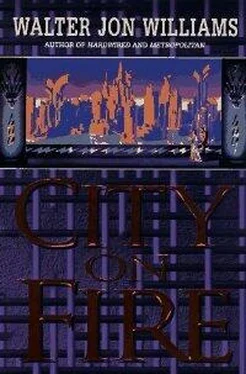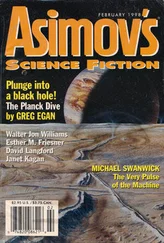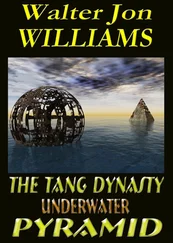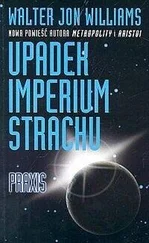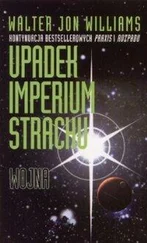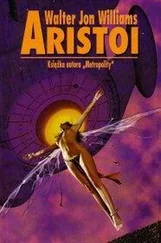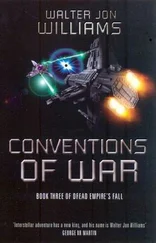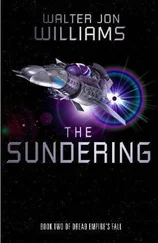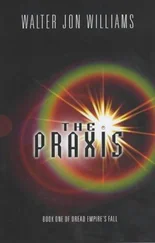Walter Williams - City on Fire
Здесь есть возможность читать онлайн «Walter Williams - City on Fire» весь текст электронной книги совершенно бесплатно (целиком полную версию без сокращений). В некоторых случаях можно слушать аудио, скачать через торрент в формате fb2 и присутствует краткое содержание. Год выпуска: 1997, ISBN: 1997, Издательство: HarperPrism, Жанр: Фантастика и фэнтези, на английском языке. Описание произведения, (предисловие) а так же отзывы посетителей доступны на портале библиотеки ЛибКат.
- Название:City on Fire
- Автор:
- Издательство:HarperPrism
- Жанр:
- Год:1997
- ISBN:0-06-105213-2
- Рейтинг книги:3 / 5. Голосов: 1
-
Избранное:Добавить в избранное
- Отзывы:
-
Ваша оценка:
- 60
- 1
- 2
- 3
- 4
- 5
City on Fire: краткое содержание, описание и аннотация
Предлагаем к чтению аннотацию, описание, краткое содержание или предисловие (зависит от того, что написал сам автор книги «City on Fire»). Если вы не нашли необходимую информацию о книге — напишите в комментариях, мы постараемся отыскать её.
City on Fire — читать онлайн бесплатно полную книгу (весь текст) целиком
Ниже представлен текст книги, разбитый по страницам. Система сохранения места последней прочитанной страницы, позволяет с удобством читать онлайн бесплатно книгу «City on Fire», без необходимости каждый раз заново искать на чём Вы остановились. Поставьте закладку, и сможете в любой момент перейти на страницу, на которой закончили чтение.
Интервал:
Закладка:
She looks up at Rohder, forces a polite smile onto her lips. “Would you like some coffee?” she asks.
Talk turns to other matters, particularly to Rohder’s teams, who are busy increasing Caraqui’s plasm supply, and then the old man takes his leave. Aiah turns up the ventila-■ tion to clear the cloud of cigaret smoke and looks at the closed folder waiting for her on the table.
Her nerves hum louder than the ventilation fans.
She opens the green folder, slips out Constantine’s article, and composes herself to read it: sitting straight in the straight chair, feet flat on the floor, hands framing the pages on the table. As if she were a schoolgirl at her desk.
Constantine’s style, she notices, is informed but not quite at ease. She can tell he’s been to college: he uses words like noetic and mensuration. The later Constantine, with less need to impress, would adopt a less specialized vocabulary, and a more accessible style.
He discusses at some length the legendary attributes of the ice man and discusses theories of how such creatures may be created. The tone is speculative—he endeavors to make it seem that he knows less about this matter than, in fact, he does. And then he addresses the primary contradiction of the ice man legends.
Why would the ice man, he asks, who exists in the core of creation, in the plasm itself, the great transformational substance, the heart of contingent reality that underlies our whole postmetropolitan world, wish to inhabit the body of a human being?
Constantine finds the answer in the hanged man’s lost body itself.
The attractions of plasm are many, but the most intense are those based on sensation. It is these appeals to the sensual, to enhanced and extended sight and hearing, to the stimulus of nerves and groin, that most often impel those who habituate themselves to plasm as an addict to morphia; and this sensual attraction, in subtler form, is a factor in the attraction of plasm to many of its other users, who experience sense gratification alongside plasm’s other enjoyments…
For the ice man there are no longer nerves to stimulate, no sensory organs to enhance, no sexual impulse to satisfy. The vital element of sensory feedback is missing: no longer is the sensual body able to bring pleasure to its now detached, and oddly diminished, mind.
But, Aiah thinks, a protest half-formed in her mind; but Constantine answers her objection before she can properly form it.
It is true that when mages project themselves through telepresence they use plasm to build a sensorium, an array of ectomorphic sense-artifacts used to bring sense-stimulation to the receptive centers of the mind. But the sensorium, however enhanced it may be, is built in imitation of the body’s own natural sense organs, and furthermore upon a series of sense-memories contained within the mind. Without a material body and its sense-organs to apprehend the world, and without a sensual memory, reinforced at every moment by a thousand natural stimuli, how is a detached, immaterial mentality to apprehend the world?
… The ice man must apprehend the world only through a created sensorium. For a human mage, a sensorium will be based on the mage’s own sense-organs and on sense-experience and memory. For an ice man, a sensorium will be based on organs that no longer exist and memories that grow ever more distant. Without an anchor planted in the body’s own sensual experience and memory, the ice man’s perceptions will become ever more distorted.
Aiah knits her brows and contemplates Constantine’s argument. It must be true, she thinks; Constantine knew Taikoen when he wrote this, and must have based all this on observation.
The hanged man lives in a world of erratic, distorted sense impressions. And Taikoen, the real man, died centuries ago. How, Aiah wonders, does he see the world now?
Presumably it takes the ice man a period of time to realize that the old pleasures are no longer there. The ice man at first may be gratified at being rid of the irritations and demands of the body. He can create an artificial sensorium and stimulate it as he wishes. The distortion of perception may not be at first apparent.
But when the realization comes, it must be devastating. The body, the center of perception, no longer exists. Perceptions are growing distorted, even deranged. Even self-stimulation may prove futile, as the ice man, lost in the transphysical plasm well, begins to forget even the nature of pleasure. The ice man may well grow desperate.
Constantine goes on to discuss the phenomenon of possession in some detail, explaining it, after numerous scholarly digressions, as a desperate attempt by the ice man to regain the sense perceptions that had once made him human.
Aiah turns the page, reads Constantine’s conclusion. A metallic taste tingles along her tongue.
What are we, then, to say of the psyche of the ice man, a murderous creature of deranged perception, forever isolated from the humanity that nurtured him, so desperate for a return to a world of sensible appearances and pleasures that it will accept temporary humanity at the cost of a human life?
We now know which taxonomy is appropriate for this phenomenon. This creature that is at once powerful and diminished, ubiquitous and isolated, desperate and raging, deadly but impotent, possessed of being but not truly alive. Hanged man is not the appropriate name, nor ice man. The only appropriate name for this creature is our third choice— the damned.
The conditions in which the ice man exists are, in almost literal terms, hellish. Uncertain as to its own perceptions, its spirit isolated, all pleasures artificial and fading, its only companions either victims or exploiters, the situation of the ice man is a compound of desperation and exile. Although its victims deserve our sorrow, the creature itself —damned— deserves more than a share of our compassion. Given the horrifying conditions under which the ice man must exist, an end to its existence must be looked on not as a death, not even as justice, but as a release, an act of mercy.
Aiah looks down at the last plastic flimsy, at the bottom crowded with endnotes in tiny print, at the slight smear on one corner caused by an error in copying. Her nerves sing with the document’s strangeness.
Why, she wonders, did Constantine write this thing? Even though it is in a speculative style, it still betrays too much knowledge. Anyone who had ever had dealings with an actual ice man would look at this and know without doubt that Constantine was a secret brother…
Perhaps when Constantine wrote this he simply didn’t care—his first encounter with Taikoen had not come at an edifying point of his life—but Aiah senses there’s something else at work here. She looks again over the last paragraph.
… the creature itself deserves more than a share of our compassion.
She wonders if Constantine is trying to make her feel sympathy for the ice man— pity my friend, he only kills because he’s a lonely perceptual cripple! But it doesn’t work, Aiah has actually met the thing. And then she wonders if Constantine wants the reader to feel sorry for Constantine himself, for the person who, out of compassion and at the risk of his life and soul, associates with the damned, with something that others would view as a demon…
That, Aiah considers, seems more plausible. It isn’t as if Constantine has not been known to turn his life into drama.
She scans the words again… an end to its existence must be looked on not as a death, not even as justice, but as a release, an act of mercy.
Читать дальшеИнтервал:
Закладка:
Похожие книги на «City on Fire»
Представляем Вашему вниманию похожие книги на «City on Fire» списком для выбора. Мы отобрали схожую по названию и смыслу литературу в надежде предоставить читателям больше вариантов отыскать новые, интересные, ещё непрочитанные произведения.
Обсуждение, отзывы о книге «City on Fire» и просто собственные мнения читателей. Оставьте ваши комментарии, напишите, что Вы думаете о произведении, его смысле или главных героях. Укажите что конкретно понравилось, а что нет, и почему Вы так считаете.
